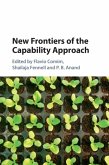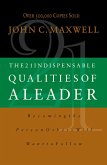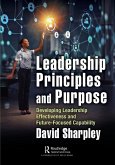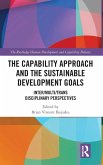The Cambridge Handbook of the Capability Approach
Herausgeber: Chiappero-Martinetti, Enrica; Qizilbash, Mozaffar; Osmani, Siddiqur
Schade – dieser Artikel ist leider ausverkauft. Sobald wir wissen, ob und wann der Artikel wieder verfügbar ist, informieren wir Sie an dieser Stelle.
The Cambridge Handbook of the Capability Approach
Herausgeber: Chiappero-Martinetti, Enrica; Qizilbash, Mozaffar; Osmani, Siddiqur
- Gebundenes Buch
- Merkliste
- Auf die Merkliste
- Bewerten Bewerten
- Teilen
- Produkt teilen
- Produkterinnerung
- Produkterinnerung
This landmark handbook collects in a single volume the current state of cutting-edge research on the capability approach. It includes a comprehensive introduction to the approach as well as new research from the leading scholars in this multi-disciplinary field, including the pioneers of capability research, Martha C. Nussbaum and Amartya Sen.
Andere Kunden interessierten sich auch für
![New Frontiers of the Capability Approach New Frontiers of the Capability Approach]() New Frontiers of the Capability Approach67,99 €
New Frontiers of the Capability Approach67,99 €![The 21 Indispensable Qualities of a Leader (International Edition) The 21 Indispensable Qualities of a Leader (International Edition)]() John C. MaxwellThe 21 Indispensable Qualities of a Leader (International Edition)12,99 €
John C. MaxwellThe 21 Indispensable Qualities of a Leader (International Edition)12,99 €![Leadership Principles and Purpose Leadership Principles and Purpose]() David SharpleyLeadership Principles and Purpose40,99 €
David SharpleyLeadership Principles and Purpose40,99 €![The Capability Approach and the Sustainable Development Goals The Capability Approach and the Sustainable Development Goals]() The Capability Approach and the Sustainable Development Goals180,99 €
The Capability Approach and the Sustainable Development Goals180,99 €![Amartya Sen's Work and Ideas Amartya Sen's Work and Ideas]() Diana Strassmann / Bina Agarwal (eds.)Amartya Sen's Work and Ideas47,99 €
Diana Strassmann / Bina Agarwal (eds.)Amartya Sen's Work and Ideas47,99 €![Quality of Life Quality of Life]() David PhillipsQuality of Life152,99 €
David PhillipsQuality of Life152,99 €![The Cambridge Handbook of Stakeholder Theory The Cambridge Handbook of Stakeholder Theory]() The Cambridge Handbook of Stakeholder Theory40,99 €
The Cambridge Handbook of Stakeholder Theory40,99 €-
-
This landmark handbook collects in a single volume the current state of cutting-edge research on the capability approach. It includes a comprehensive introduction to the approach as well as new research from the leading scholars in this multi-disciplinary field, including the pioneers of capability research, Martha C. Nussbaum and Amartya Sen.
Produktdetails
- Produktdetails
- Verlag: Cambridge University Press
- Seitenzahl: 740
- Erscheinungstermin: 19. November 2020
- Englisch
- Abmessung: 251mm x 180mm x 47mm
- Gewicht: 1382g
- ISBN-13: 9781107115286
- ISBN-10: 1107115280
- Artikelnr.: 58698823
- Herstellerkennzeichnung
- Libri GmbH
- Europaallee 1
- 36244 Bad Hersfeld
- gpsr@libri.de
- Verlag: Cambridge University Press
- Seitenzahl: 740
- Erscheinungstermin: 19. November 2020
- Englisch
- Abmessung: 251mm x 180mm x 47mm
- Gewicht: 1382g
- ISBN-13: 9781107115286
- ISBN-10: 1107115280
- Artikelnr.: 58698823
- Herstellerkennzeichnung
- Libri GmbH
- Europaallee 1
- 36244 Bad Hersfeld
- gpsr@libri.de
Foreword Amartya Sen; General introduction Enrica Chiappero-Martinetti,
Siddiqur Osmani and Mozaffar Qizilbash; Part I. Historical Antecedents and
Philosophical Debates: Introduction to Part I Mozaffar Qizilbash; 1. The
capabilities approach and the history of philosophy Martha C. Nussbaum; 2.
Karl Marx and the capabilities approach David Leopold; 3. Utility and
capability: J. S. Mill and Amartya Sen L. Wayne Sumner; 4. Intellectual
history and defending the capabilities approach David Weinstein; 5. Sen,
Smith and the Cambridge tradition Luigino Bruni; 6. The capability approach
to well-being and freedom from the viewpoint of welfare economics and
social choice theory Kotaro Suzumura; 7. Resources or capabilities? An
introduction to the debate Ilse Oosterlaken; 8. Taking multidimensionality
seriously: capabilities, Rawls's primary goods, and guiding action Henry S.
Richardson; 9. The capabilities approach and political liberalism Richard
Arneson; 10. Selecting a list: the capability approach's Achilles heel
Rutger Claassen; 11. Individualism and the capability approach: the role of
collectivities in expanding human capabilities Solava Ibrahim; 12. The
politics of wonder: the capabilities approach in the context of mass
extinction Jeremy Bendik-Keymer; Part II. Methods, Measurement and
Empirical Evidence: Introduction to Part II Enrica Chiappero-Martinetti;
13. Social choice and the capability approach Maurice Salles; 14. On
capability and its measurement Prasanta K. Pattanaik and Yongsheng Xu; 15.
Analyzing capabilities: games, groups and effectivity Martin van Hees; 16.
Implementing the capability approach with respect for individual
valuations: an illustration with Colombian data Koen Decancq, Erik
Schokkaert and Blanca Zuluaga; 17. Capability, opportunity, outcome - and
equality Ravi Kanbur; 18. The distribution of capabilities: up, down,
sideways and along Tania Burchardt; 19. Inter-group disparities in the
distribution of human development: two apparent conundrums and how we might
address them Peter J. Lambert and Sreenivasan Subramanian; 20.
Multidimensional inequality and human development Suman Seth and Maria Emma
Santos; 21. The research agenda on multidimensional poverty measurement:
important and as-yet unanswered questions Sabina Alkire; 22. Measuring
gender inequality using the capability approach: issues and challenges
Stephan Klasen; 23. Econometric and statistical models for operationalising
the capability approach Jaya Krishnakumar; 24. Expanding capabilities
through participatory action research Alejandra Boni and Alexandre Apsan
Frediani; Part III. Issues in Public Policy: Introduction to Part III
Siddiqur Osmani; 25. On education and capabilities expansion Melanie
Walker; 26. Capability approach to children's well-being and well-becoming
Mario Biggeri; 27. Capability and disability Lorella Terzi; 28. Social
exclusion and capability development Jonathan Wolff; 29. Human security Des
Gasper; 30. Income inequality and human capabilities Rolph van der Hoeven;
31. The capability approach and human rights Polly Vizard; 32. Capabilities
and the law Katharine Gelber; 33. Capabilities, public reason and
democratic deliberation Jay Drydyk; 34. Entitlements and capabilities
Sanjay G. Reddy and Adel Daoud; 35. Religion and the capability approach
Séverine Deneulin and Augusto Zampini-Davies.
Siddiqur Osmani and Mozaffar Qizilbash; Part I. Historical Antecedents and
Philosophical Debates: Introduction to Part I Mozaffar Qizilbash; 1. The
capabilities approach and the history of philosophy Martha C. Nussbaum; 2.
Karl Marx and the capabilities approach David Leopold; 3. Utility and
capability: J. S. Mill and Amartya Sen L. Wayne Sumner; 4. Intellectual
history and defending the capabilities approach David Weinstein; 5. Sen,
Smith and the Cambridge tradition Luigino Bruni; 6. The capability approach
to well-being and freedom from the viewpoint of welfare economics and
social choice theory Kotaro Suzumura; 7. Resources or capabilities? An
introduction to the debate Ilse Oosterlaken; 8. Taking multidimensionality
seriously: capabilities, Rawls's primary goods, and guiding action Henry S.
Richardson; 9. The capabilities approach and political liberalism Richard
Arneson; 10. Selecting a list: the capability approach's Achilles heel
Rutger Claassen; 11. Individualism and the capability approach: the role of
collectivities in expanding human capabilities Solava Ibrahim; 12. The
politics of wonder: the capabilities approach in the context of mass
extinction Jeremy Bendik-Keymer; Part II. Methods, Measurement and
Empirical Evidence: Introduction to Part II Enrica Chiappero-Martinetti;
13. Social choice and the capability approach Maurice Salles; 14. On
capability and its measurement Prasanta K. Pattanaik and Yongsheng Xu; 15.
Analyzing capabilities: games, groups and effectivity Martin van Hees; 16.
Implementing the capability approach with respect for individual
valuations: an illustration with Colombian data Koen Decancq, Erik
Schokkaert and Blanca Zuluaga; 17. Capability, opportunity, outcome - and
equality Ravi Kanbur; 18. The distribution of capabilities: up, down,
sideways and along Tania Burchardt; 19. Inter-group disparities in the
distribution of human development: two apparent conundrums and how we might
address them Peter J. Lambert and Sreenivasan Subramanian; 20.
Multidimensional inequality and human development Suman Seth and Maria Emma
Santos; 21. The research agenda on multidimensional poverty measurement:
important and as-yet unanswered questions Sabina Alkire; 22. Measuring
gender inequality using the capability approach: issues and challenges
Stephan Klasen; 23. Econometric and statistical models for operationalising
the capability approach Jaya Krishnakumar; 24. Expanding capabilities
through participatory action research Alejandra Boni and Alexandre Apsan
Frediani; Part III. Issues in Public Policy: Introduction to Part III
Siddiqur Osmani; 25. On education and capabilities expansion Melanie
Walker; 26. Capability approach to children's well-being and well-becoming
Mario Biggeri; 27. Capability and disability Lorella Terzi; 28. Social
exclusion and capability development Jonathan Wolff; 29. Human security Des
Gasper; 30. Income inequality and human capabilities Rolph van der Hoeven;
31. The capability approach and human rights Polly Vizard; 32. Capabilities
and the law Katharine Gelber; 33. Capabilities, public reason and
democratic deliberation Jay Drydyk; 34. Entitlements and capabilities
Sanjay G. Reddy and Adel Daoud; 35. Religion and the capability approach
Séverine Deneulin and Augusto Zampini-Davies.
Foreword Amartya Sen; General introduction Enrica Chiappero-Martinetti,
Siddiqur Osmani and Mozaffar Qizilbash; Part I. Historical Antecedents and
Philosophical Debates: Introduction to Part I Mozaffar Qizilbash; 1. The
capabilities approach and the history of philosophy Martha C. Nussbaum; 2.
Karl Marx and the capabilities approach David Leopold; 3. Utility and
capability: J. S. Mill and Amartya Sen L. Wayne Sumner; 4. Intellectual
history and defending the capabilities approach David Weinstein; 5. Sen,
Smith and the Cambridge tradition Luigino Bruni; 6. The capability approach
to well-being and freedom from the viewpoint of welfare economics and
social choice theory Kotaro Suzumura; 7. Resources or capabilities? An
introduction to the debate Ilse Oosterlaken; 8. Taking multidimensionality
seriously: capabilities, Rawls's primary goods, and guiding action Henry S.
Richardson; 9. The capabilities approach and political liberalism Richard
Arneson; 10. Selecting a list: the capability approach's Achilles heel
Rutger Claassen; 11. Individualism and the capability approach: the role of
collectivities in expanding human capabilities Solava Ibrahim; 12. The
politics of wonder: the capabilities approach in the context of mass
extinction Jeremy Bendik-Keymer; Part II. Methods, Measurement and
Empirical Evidence: Introduction to Part II Enrica Chiappero-Martinetti;
13. Social choice and the capability approach Maurice Salles; 14. On
capability and its measurement Prasanta K. Pattanaik and Yongsheng Xu; 15.
Analyzing capabilities: games, groups and effectivity Martin van Hees; 16.
Implementing the capability approach with respect for individual
valuations: an illustration with Colombian data Koen Decancq, Erik
Schokkaert and Blanca Zuluaga; 17. Capability, opportunity, outcome - and
equality Ravi Kanbur; 18. The distribution of capabilities: up, down,
sideways and along Tania Burchardt; 19. Inter-group disparities in the
distribution of human development: two apparent conundrums and how we might
address them Peter J. Lambert and Sreenivasan Subramanian; 20.
Multidimensional inequality and human development Suman Seth and Maria Emma
Santos; 21. The research agenda on multidimensional poverty measurement:
important and as-yet unanswered questions Sabina Alkire; 22. Measuring
gender inequality using the capability approach: issues and challenges
Stephan Klasen; 23. Econometric and statistical models for operationalising
the capability approach Jaya Krishnakumar; 24. Expanding capabilities
through participatory action research Alejandra Boni and Alexandre Apsan
Frediani; Part III. Issues in Public Policy: Introduction to Part III
Siddiqur Osmani; 25. On education and capabilities expansion Melanie
Walker; 26. Capability approach to children's well-being and well-becoming
Mario Biggeri; 27. Capability and disability Lorella Terzi; 28. Social
exclusion and capability development Jonathan Wolff; 29. Human security Des
Gasper; 30. Income inequality and human capabilities Rolph van der Hoeven;
31. The capability approach and human rights Polly Vizard; 32. Capabilities
and the law Katharine Gelber; 33. Capabilities, public reason and
democratic deliberation Jay Drydyk; 34. Entitlements and capabilities
Sanjay G. Reddy and Adel Daoud; 35. Religion and the capability approach
Séverine Deneulin and Augusto Zampini-Davies.
Siddiqur Osmani and Mozaffar Qizilbash; Part I. Historical Antecedents and
Philosophical Debates: Introduction to Part I Mozaffar Qizilbash; 1. The
capabilities approach and the history of philosophy Martha C. Nussbaum; 2.
Karl Marx and the capabilities approach David Leopold; 3. Utility and
capability: J. S. Mill and Amartya Sen L. Wayne Sumner; 4. Intellectual
history and defending the capabilities approach David Weinstein; 5. Sen,
Smith and the Cambridge tradition Luigino Bruni; 6. The capability approach
to well-being and freedom from the viewpoint of welfare economics and
social choice theory Kotaro Suzumura; 7. Resources or capabilities? An
introduction to the debate Ilse Oosterlaken; 8. Taking multidimensionality
seriously: capabilities, Rawls's primary goods, and guiding action Henry S.
Richardson; 9. The capabilities approach and political liberalism Richard
Arneson; 10. Selecting a list: the capability approach's Achilles heel
Rutger Claassen; 11. Individualism and the capability approach: the role of
collectivities in expanding human capabilities Solava Ibrahim; 12. The
politics of wonder: the capabilities approach in the context of mass
extinction Jeremy Bendik-Keymer; Part II. Methods, Measurement and
Empirical Evidence: Introduction to Part II Enrica Chiappero-Martinetti;
13. Social choice and the capability approach Maurice Salles; 14. On
capability and its measurement Prasanta K. Pattanaik and Yongsheng Xu; 15.
Analyzing capabilities: games, groups and effectivity Martin van Hees; 16.
Implementing the capability approach with respect for individual
valuations: an illustration with Colombian data Koen Decancq, Erik
Schokkaert and Blanca Zuluaga; 17. Capability, opportunity, outcome - and
equality Ravi Kanbur; 18. The distribution of capabilities: up, down,
sideways and along Tania Burchardt; 19. Inter-group disparities in the
distribution of human development: two apparent conundrums and how we might
address them Peter J. Lambert and Sreenivasan Subramanian; 20.
Multidimensional inequality and human development Suman Seth and Maria Emma
Santos; 21. The research agenda on multidimensional poverty measurement:
important and as-yet unanswered questions Sabina Alkire; 22. Measuring
gender inequality using the capability approach: issues and challenges
Stephan Klasen; 23. Econometric and statistical models for operationalising
the capability approach Jaya Krishnakumar; 24. Expanding capabilities
through participatory action research Alejandra Boni and Alexandre Apsan
Frediani; Part III. Issues in Public Policy: Introduction to Part III
Siddiqur Osmani; 25. On education and capabilities expansion Melanie
Walker; 26. Capability approach to children's well-being and well-becoming
Mario Biggeri; 27. Capability and disability Lorella Terzi; 28. Social
exclusion and capability development Jonathan Wolff; 29. Human security Des
Gasper; 30. Income inequality and human capabilities Rolph van der Hoeven;
31. The capability approach and human rights Polly Vizard; 32. Capabilities
and the law Katharine Gelber; 33. Capabilities, public reason and
democratic deliberation Jay Drydyk; 34. Entitlements and capabilities
Sanjay G. Reddy and Adel Daoud; 35. Religion and the capability approach
Séverine Deneulin and Augusto Zampini-Davies.








